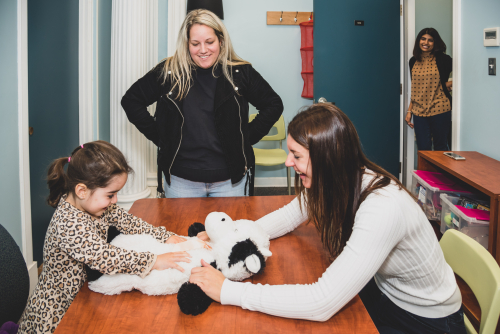Graduate Certificate in Early Childhood Intervention Webinar
Tuesday, December 16th @ 7PM
Graduate Certificate in Early Childhood Intervention Webinar
Tuesday, December 16th @ 7PM
On this Page: About Us | Academic and Outreach Activities | Programs and Training | Awards and Funding
 The Daniel and Monica Gold Centre for Early Childhood Development is guided by a simple yet powerful belief: that every child deserves the best possible start in life. Providing all children with the best supports, well-timed interventions and quality education in the early childhood years can provide a transformative and lasting impact on children’s futures and their positive development. For children with learning differences and neurodivergences, early diagnosis, evidence-based interventions, mental health support, and adult advocacy are key to their long-term growth.
The Daniel and Monica Gold Centre for Early Childhood Development is guided by a simple yet powerful belief: that every child deserves the best possible start in life. Providing all children with the best supports, well-timed interventions and quality education in the early childhood years can provide a transformative and lasting impact on children’s futures and their positive development. For children with learning differences and neurodivergences, early diagnosis, evidence-based interventions, mental health support, and adult advocacy are key to their long-term growth.
The Centre's mission is to help all children, especially those who face learning differences or developmental challenges, thrive in school and beyond. Rooted in the latest research on learning and development, the Centre supports children, families, and educators by creating innovative programs, resources, and training. Through research, education, outreach and community partnerships, the Centre's team works to ensure that every child’s curiosity, capacity, and potential are nurtured.
 Victoria Talwar is the Director of the Daniel and Monica Gold Centre for Early Childhood Development and a leading expert in children’s social-cognitive and moral development from the earliest years onward. With over two decades of research experience, she has examined how children understand, interpret, and respond to social information in diverse contexts—including honesty and deception, empathy and prosocial behavior, the challenges of children’s online engagement, and legal settings where children’s testimony and credibility are critical.
Victoria Talwar is the Director of the Daniel and Monica Gold Centre for Early Childhood Development and a leading expert in children’s social-cognitive and moral development from the earliest years onward. With over two decades of research experience, she has examined how children understand, interpret, and respond to social information in diverse contexts—including honesty and deception, empathy and prosocial behavior, the challenges of children’s online engagement, and legal settings where children’s testimony and credibility are critical.
Dr. Talwar’s work integrates developmental science with real-world applications, informing educational practices, parenting strategies, legal procedures, and policy aimed at fostering children’s well-being both offline and in the digital world. She is recognized internationally for her contributions to understanding how early experiences—across physical, digital, and legal environments—shape lifelong social, emotional, and moral growth.
 Sheryl Smith-Gilman has dedicated many years to McGill's Department of Integrated Studies in Education (DISE), with a focus on enhancing teacher education. Her work addresses contemporary curriculum challenges and embraces diverse teaching methods and pedagogies. As a researcher, educator, and consultant, her efforts have concentrated on early childhood education, particularly in the realms of teaching and pedagogy. She is deeply committed to advancing the goals of the Truth and Reconciliation Commission (TRC) by developing Indigenous knowledge and cultural approaches into early childhood education. Her work particularly emphasizes the arts as a means to enrich educational experiences and strengthen cultural identity.
Sheryl Smith-Gilman has dedicated many years to McGill's Department of Integrated Studies in Education (DISE), with a focus on enhancing teacher education. Her work addresses contemporary curriculum challenges and embraces diverse teaching methods and pedagogies. As a researcher, educator, and consultant, her efforts have concentrated on early childhood education, particularly in the realms of teaching and pedagogy. She is deeply committed to advancing the goals of the Truth and Reconciliation Commission (TRC) by developing Indigenous knowledge and cultural approaches into early childhood education. Her work particularly emphasizes the arts as a means to enrich educational experiences and strengthen cultural identity.
In addition to her academic pursuits, she has served as a pedagogical consultant to the Quebec Ministry of Education, focusing on preschool education and is recognized as an authority on the Reggio Emilia approach in preschool settings. Sheryl Smith-Gilman's contributions to the field are reflected in several journal articles and book chapters that she has authored, which explore various aspects of her teaching and research interests.
 Maija-Liisa Harju is a multidisciplinary scholar, educator, and consultant specializing in children’s literature, identities, and education. She has contributed to critical research initiatives focused on children’s and teacher education, including the Walking Alongside project (reconciliatory practices in teacher education), and Architecture Playshop (climate education through the built environment) at McGill University.
Maija-Liisa Harju is a multidisciplinary scholar, educator, and consultant specializing in children’s literature, identities, and education. She has contributed to critical research initiatives focused on children’s and teacher education, including the Walking Alongside project (reconciliatory practices in teacher education), and Architecture Playshop (climate education through the built environment) at McGill University.
Dr. Harju’s scholarship explores the transformative power of narrative and storytelling in shaping identity, memory, and emotional development. Her work highlights the pedagogical potential of story and play to help children engage with complex themes such as death and anxiety, intergenerational connections, and relationships with the natural world. In her role facilitating Gold Centre programs, Dr. Harju will continue to support children, families, and educators, and further explore the ways young children understand and story their experiences.
 The Gold Centre supports training programs guided by an attention to psycho-pedagogical methods, emphasizing:
The Gold Centre supports training programs guided by an attention to psycho-pedagogical methods, emphasizing:
 Graduate Certificate in Early Childhood Intervention
Graduate Certificate in Early Childhood InterventionThe Graduate Certificate in Early Childhood Intervention provides advanced training to support young children (ages 3-8 years old) with neuro-diversities. The program focuses on designing and implementing interventions that address cognitive, social, and emotional development.
The Gold Research Centre Student Stipends provide funding support for Masters and PhD students engaged in a program in the Faculty of Education that will advance their research in Early Childhood Development (e.g., social-emotional, cognitive or physical development, neurodiverse learning, clinical assessment, innovative educational approaches).
The Gold Research Centre Small Research Project Funding provides McGill University Department of Education researchers with support for new initiatives and ideas that can help advance research relating to Early Childhood Development (e.g., social-emotional, cognitive or physical development, neurodiverse learning, clinical assessment, innovative educational approaches).